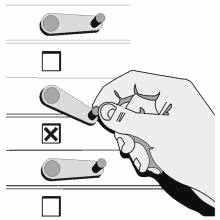031
"Voting Rights" No other democracy besides the U.S. disenfranchises convicted offenders for life. Many democratic nations, including Denmark, France, Israel, and Poland, permit prisoners to vote as well.
This advertisement appeared in the National Review, the The New Republic, the Weekly Standard, The Nation, Reason Magazine and The Progressive, fall 2000.
Available in printer-ready Portable Document Format (PDF).
This advertisement appeared in the National Review, the The New Republic, the Weekly Standard, The Nation, Reason Magazine and The Progressive, fall 2000.
Available in printer-ready Portable Document Format (PDF).
|
On November 7, millions won't be allowed to vote! |

| |
|---|---|---|
|
Suffrage, the bedrock of the Constitution, is being eroded in the name of the War on Drugs. | ||
| There are nearly four million persons currently or permanently disenfranchised as a result of laws that take away the voting rights of felons and ex-felons. | ||
| No other democracy besides the U.S. disenfranchises convicted offenders for life. Many democratic nations, including Denmark, France, Israel, and Poland, permit prisoners to vote as well. | ||
| Nearly three-quarters (73 percent) of the disenfranchised are not in prison but are on probation, on parole or have completed their sentences. | ||
| 1.4 million African American men -- 13 percent of the adult African American male population -- have lost the right to vote, a rate of disenfranchisement that is seven times the national average. By comparison, in the 1996 general election 4.6 million African American men voted. | ||
| In Florida one in three African American men has permanently lost the right to vote. | ||
| In five states Iowa, Mississippi, New Mexico, Virginia, and Wyoming one in four black men (24% to 28%) have permanently lost the right to vote. | ||
Can we expect people to be responsible citizens
| ||
|
Common Sense for Drug Policy, Kevin B. Zeese, President 703-354-9050, 703-354-5695 (fax), info@csdp.org, www.csdp.org | ||
| Sources: Fellner, Jamie and Mauer, Marc, "Losing the Vote: The Impact of Felony Disenfranchisement Laws in the United States (Washington, DC: Human Rights Watch & The Sentencing Project, 1998). Mauer, Marc and Allard, Patricia, "Regaining the Vote: An Assessment of Activity Relating to Felon Disenfranchisement Laws" (Washington, DC: Sentencing Project, January 2000), from the web at http://www.sentencingproject.org/news/regainvote.htm, last accessed Sept. 27, 2000. | ||
Download PDF
